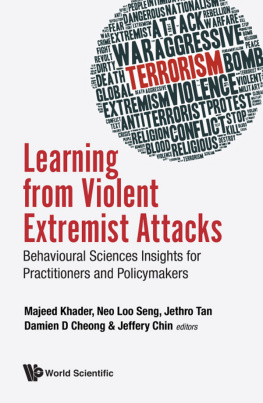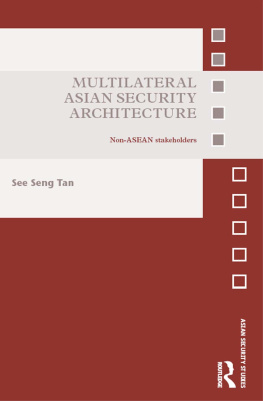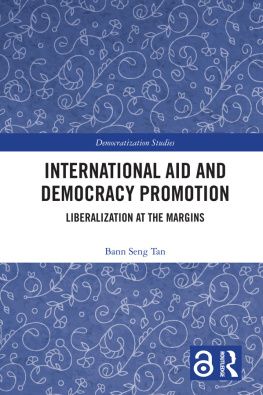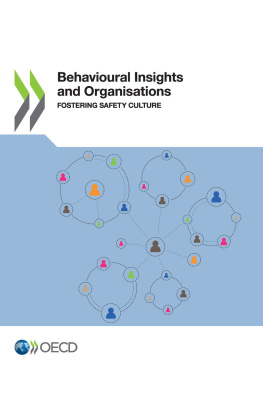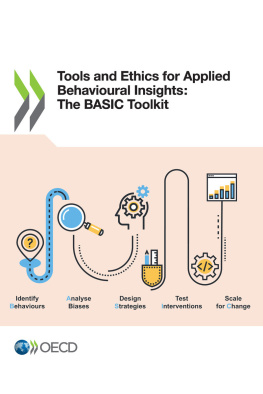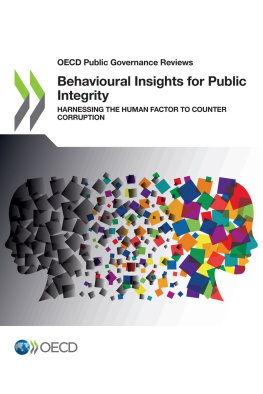Learning from Violent Extremist Attacks: Behavioural Sciences Insights for Practitioners and Policymakers is a significant piece of work written with the security practitioner and policy-maker in mind. It is a collection of thoughtful contributions by a community of social scientists, led by Dr. Majeed Khader and his fellow editors, applying their training, scholarship, and experience to try and unpack various facets of the complex phenomenon of violent extremism we are faced with today.
The project is ambitious and formidable in its comprehensiveness tackling a full range of issues and questions on the subject from the individual and social psychology of extremists, the strength and limits of different assessment tools, and of approaches to rehabilitation, to societal resilience, crisis planning, and consequence management in a public engagement terrain permeated by social media. And, for good measure, it even raises the potential boon for policing and counter-terrorism agencies that can accrue from tapping smart technology in a smart city like Singapore.
Notwithstanding its very broad range, stretched and covered in more than 600 pages, the reader will be pleased to find that its individual chapter-pieces are typically written in a succinct, balanced, and pointed manner, making them reader-friendly and very accessible. More importantly, the reader will also find that many of these pieces consistently succeed in drawing out practical lessons, raising crucial questions including prevailing knowledge deficits (which researchers can follow up on), and frequently offer valuable insights, which can only better inform and inspire policy and practice.
Dr. Majeed and his team are to be congratulated for this very commendable collaborative work. It reflects a healthy and growing community of social scientists in Singapore and the region who are focused and engaged in a subject of real and urgent importance to the well-being of our various societies. And it has produced this book which I would strongly recommend as an essential read for all who want to know more and to better understand this complex subject we are still grappling with today.
Mr. Benny Lim
Permanent Secretary, Ministry of Home Affairs (20052011),
and Permanent Secretary, National Security and Intelligence
Coordination (20112016)
This book is an essential read for those kept awake at night wondering how they can stop the next attack and what to do the day after. Majeed Khader and his team of behavioural scientists have provided lessons that inform both policy-making and operational tactics. For the academic researcher, the book also offers a rare Asian perspective on a global scourge.
Mr. Ali Soufan
CEO of The Soufan Group, author of The Black Banners &
Anatomy of Terror, and former FBI Supervisory Special Agent
This is both an important and timely publication. The rich and textured offerings within go some considerable way to bridging the gap between academia and practitioners in the field of countering violent extremism and radicalisation studies. The sheer wealth of insights will repay close reading on the part of the expert, practitioner, or diligent layman.
Dr. Shashi Jayakumar
Senior Fellow, and Head, Centre of Excellence for
National Security, RSIS, and Executive Coordinator,
Future Issues and Technology


Published by
World Scientific Publishing Co. Pte. Ltd.
5 Toh Tuck Link, Singapore 596224
USA office: 27 Warren Street, Suite 401-402, Hackensack, NJ 07601
UK office: 57 Shelton Street, Covent Garden, London WC2H 9HE
British Library Cataloguing-in-Publication Data
A catalogue record for this book is available from the British Library.
LEARNING FROM VIOLENT EXTREMIST ATTACKS
Behavioural Sciences Insights for Practitioners and Policymakers
Copyright 2019 The Authors
All rights reserved.
ISBN 978-981-3275-43-0
For any available supplementary material, please visit
https://www.worldscientific.com/worldscibooks/10.1142/11134#t=suppl
Desk Editor: Karimah Samsudin
Typeset by Stallion Press
Email:
Printed in Singapore
Acknowledgements
This book is a testimonial to the valued relationships and collaborations that the editors have developed with subject matter experts over the years. Thus, we would like to acknowledge the generous help and support that we have received from all the remarkable people involved in this book. Without their support, this book would not have become a reality.
We would like to take this opportunity to thank World Scientific Publishing, the publisher of this book, and in particular, Ms. Karimah Samsudin, the editor who has supported us tirelessly throughout this book project.
Next, we are profoundly grateful to the authors who are gracious enough to contribute their expertise and for their faith in the project.
A number of the Home Team Behavioural Sciences Centre (HTBSC) colleagues gave generously of their time, insights, and administrative support. We would like to acknowledge Ms. Pamela Goh, Ms. Verity Er, and Ms. Vaishnavi Honnavalli for providing valuable assistance and reviews that greatly improved the coherence and readability of the book. Ms. Ruth Gan and Ms. Rae Yi Yap also provided extremely valuable formatting input during the final edit of the book. They have been superb.
This project is not an official government endeavour and has not received government funding in any way. The views expressed here represent the views of the authors mainly and the editors. They do not represent the official views of the Government of Singapore in anyway. Despite this, we have received encouragement. For this, we are grateful to Mr. Pang Kin Keong, Mr. Leo Yip, Mr. Lai Chung Han, Mr. Loh Ngai Seng, Ms. Goh Soon Poh, Mr. Puah Kok Keong, Mr. T. Raja Kumar, Mr. Hoong Wee Teck, Mr. Desmond Chin, Mr. Eric Yap Wee Teck, Mr. Clarence Yeo, and Mr. Teo Tze Fang for their support and guidance which have greatly contributed to the rigour of this book project. We are also thankful for the support from Mr. Abdul Jalil, Mr. S. Krishnan, Dr. Rosleenda Mohamad Ali, and Ms. Bridget Roberts. In addition, we would like to express our most sincere gratitude to Ms. Chua Lee Hoong for her valuable support. We would also like to express our appreciation to the support provided by our valued-partners from Ministry of Home Affairs [Joint Training Centre (JTC), Heritage Development Unit (HDU), Centre for Protective Security Studies (CPSS)], Naval Criminal Investigative Service (NCIS) Singapore Field Office, Universitas Indonesia (UI), The Japanese Embassy of Singapore, and Southeast Asia Regional Centre for Counter Terrorism (SEARCCT). At Nanyang Technological University (NTU), our thanks go to Associate Professor Joyce Pang, Associate Professor Ringo Ho, and Associate Professor Kumar Ramakrishna for their support, guidance, and help with this project.
Furthermore, we wish to convey our heartfelt appreciation to our colleagues at HTBSC and National Security Studies Programme for their personal and professional support. Their moral support and dedicated involvement were our motivational force for this project.
Finally, the editors would like to take this opportunity to thank the members of our families. Majeed is deeply thankful to Leong Tscheng Yee, Tasneem and Raouf, and his mum Hawa for their unconditional love and support. Loo Seng is deeply indebted to his wife, Onpapha, and his three children, Xi Zhen, An Qi, and An Ping, for their love and support. Jethro could not have completed this book without the support of his loving wife, Peiwei. Damien would like to thank V, M, and C for their unwavering dedication, and K, NSSP, and RSIS colleagues for their continued support. Jeffery is grateful to his wife, Mol, for her love, understanding, and unwavering support.

